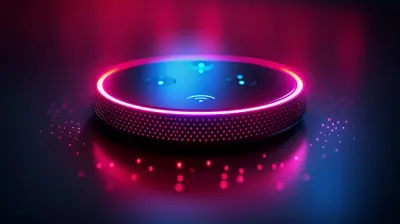The Future of Quantum Computing in Consumer Tech
19 July 2025
Quantum computing.
Just the phrase sounds like it’s straight out of a sci-fi movie, right? Like something you'd expect to see in Star Trek or hear about while watching a documentary narrated by Morgan Freeman. It feels distant, complex, and, to be honest, a bit intimidating.
But what if I told you that quantum computing isn’t some far-off dream that'll stay hidden in top-secret labs forever? What if it’s quietly creeping into the future of everyday tech — the stuff we actually use in our homes, pockets, and even our wrists?
Crazy? Maybe. But let’s dive into it.

What’s Quantum Computing, Really?
Before we go sprinting toward how it could change consumer tech, let’s chill and take a quick refresher. Quantum computing isn’t just a beefed-up version of your regular laptop. It’s something entirely different.Classic computers (the one you’re likely reading this on right now) process information in binary — 0s and 1s. That’s their entire language. Quantum computers? They speak in qubits (quantum bits), which can be 0, 1, or both at the same time thanks to a property called superposition.
And that’s not all. There’s entanglement (qubits being mysteriously linked no matter how far apart they are) and quantum tunneling (where particles pass through barriers as if they’re ghosts). Yeah, it’s wild.
What does all this mean in simple terms? Quantum computers can crunch complex problems way faster than traditional computers ever could. It’s like comparing a bicycle to a rocket ship.

Where’s Quantum Computing at Today?
Let’s be honest — quantum computers today are mostly living in labs, surrounded by scientists in lab coats who love whiteboards full of equations.Brands like IBM, Google, and D-Wave are leading the charge, and they’ve already built machines with dozens — even hundreds — of qubits. But here’s the thing: these systems need ultra-cold environments (think colder than space) and are super sensitive. So, unless you’ve got a cryogenic fridge in your garage, you’re not plugging one in any time soon.
Still, things are moving fast. We’re talking exponential progress. Just a few years ago, quantum supremacy (Google’s quantum processor solving a problem in seconds that’d take a supercomputer 10,000 years) was headline news.

So, Will Quantum Computing Ever Be in Consumer Tech?
It’s a fair question. Right now, there’s a noticeable gap between high-end research and consumer gadgets. But don’t count it out. Here’s why quantum tech might slowly (or maybe not-so-slowly) seep into our everyday lives.1. Quantum-Enhanced Devices
Think of quantum computing not as a full replacement, but more like a supercharged sidekick. Quantum processors could one day be integrated with traditional chips — kind of like how we use GPUs for gaming and AI tasks today.Down the line, smartphones or wearables might have tiny quantum co-processors helping them run more efficiently. That could mean better battery life, faster processing, and way smarter AI assistants. Imagine Siri or Alexa becoming more like Jarvis from Iron Man.
2. Ultra-Secure Communication
Privacy is a massive deal these days. Quantum mechanics brings us quantum key distribution (QKD), which is basically unhackable encryption. If someone tries to eavesdrop on the communication, the quantum state changes — and boom, you’re alerted.We might see this used in consumer messaging apps, payment systems, or even smart homes. Quantum messaging could be the next WhatsApp, only built like a digital Fort Knox.
3. Next-Gen AI and Personal Assistants
One of the showstoppers of quantum computing is its ability to supercharge machine learning. Let’s be real — we already rely on AI for everything from Netflix recommendations to unlocking our phones with face ID.Now picture this: a quantum-boosted AI assistant that understands you way better. It could analyze your habits, predict your needs, and help you manage your life with next-level precision — all without crushing your device's processor or draining your battery.
4. Smarter IoT Devices
Your smart fridge, thermostat, and even your vacuum are all part of the IoT (Internet of Things). Quantum computing could help manage these networks more efficiently. We're talking real-time optimization, minimal energy waste, and smoother interactions.Think of a smart home that actually feels smart — adjusting everything perfectly without you needing to lift a finger.

The Roadblocks to Consumer Quantum Tech
Okay, so before we start throwing quantum computers into our backpacks, let’s hit pause for a sec. There are some serious challenges we need to overcome.1. Affordability
Quantum machines aren’t exactly cheap. The tech is high-end, the materials are exotic, and the maintenance (hello, cryogenics!) is wild. Right now, even the most stripped-down models cost millions.But here’s the good news — costs drop as tech advances. Remember how flat-screen TVs used to cost a fortune? Now you can grab one at Walmart for less than your cellphone bill. The same could happen here… eventually.
2. Size & Stability
Quantum computers are still massive and fragile. They hate noise, heat, vibration — basically anything that disrupts their delicate qubit dance.To make them work in consumer tech, we need hardware breakthroughs. We’re talking miniaturization, temperature control, and better materials. It’s tough, but totally doable — especially with big names like Intel and Microsoft pouring billions into research.
3. The Software Gap
Quantum computing needs entirely new software. We can’t just copy-paste code from traditional computers. Developers will need to think differently, maybe even learn new programming languages.To make things user-friendly, we’ll need quantum software platforms and APIs that connect developers to quantum fog in the background while consumers enjoy sleek, simple apps.
Big Tech’s Quantum Leap
We’re not the only ones dreaming about quantum-powered devices. Tech giants are already working behind the scenes to make it a reality.- Google: Already achieved quantum supremacy and is working on error correction and scaling up.
- IBM: Has its own quantum network and offers cloud-based quantum computing tools for developers.
- Microsoft: Bet big on topological qubits, aiming for a more stable quantum future.
- Intel: Focused on integrating quantum computing into existing chip architecture.
And that’s just scratching the surface.
Startups like Rigetti, IonQ, Xanadu, and PsiQuantum are bringing fresh ideas to the table as well. The race is on.
What Could Quantum Computing Mean for You?
Let’s zoom out and think big-picture.We live in a hyper-connected, data-flooded world where speed, security, and intelligence are everything. Quantum computing could give us tech that thinks faster, functions smoother, and protects better. Whether it’s your morning routine, your health tracking wearables, or even your kid’s learning apps — quantum tech will eventually touch your life.
Here are just a few future scenarios:
- Your smartwatch instantly decodes complex health analytics and sends recommendations.
- Your smart glasses overlay real-time language translation with no lag.
- Your kids’ AR/VR educational apps adjust in real-time to their learning speed, all powered by quantum-enhanced AI.
Sounds futuristic? Totally. But remember, not long ago, smartphones, GPS, and voice assistants were pipe dreams too.
So, When Will This Happen?
That’s the million-dollar question.Real talk: you’re not getting a quantum iPhone next year. We're probably a decade or so away from seeing quantum seriously embedded into consumer tech. But it’s coming — slowly, steadily, and irresistibly.
Right now, it’s all about laying the groundwork. The hardware’s improving. Software’s evolving. Investments are pouring in. And once the tech crosses a certain threshold, adoption will skyrocket — just like with the internet, smartphones, and AI.
Final Thoughts: A Glimpse of Tomorrow
Quantum computing has the power to redefine what we expect from our technology. It’s not just about faster gadgets or shinier screens — it’s about re-imagining possibility.We’re standing at the edge of something massive, and while it won’t happen overnight, the future is building brick by quantum brick. The next-gen tech revolution won’t just be digital — it'll be quantum.
So next time you ask your smart speaker to play your favorite song or your phone unlocks with just a glance, just remember — behind all that, a quantum leap might be coming.
Whether you’re a tech nerd, a curious explorer, or just someone who loves new gadgets, keep an eye on this space. Because when quantum computing meets consumer tech?
The future will never be the same.
all images in this post were generated using AI tools
Category:
Technology InnovationAuthor:

Pierre McCord
Discussion
rate this article
2 comments
Mackenzie McLanahan
Great insights! It's exciting to see how quantum computing could reshape consumer tech. The potential for innovation is immense, and I can’t wait to see what comes next!
November 26, 2025 at 4:49 AM

Pierre McCord
Thank you! I share your excitement about the transformative potential of quantum computing in consumer tech. The future looks promising!
Upton Wolfe
Quantum computing holds transformative potential for consumer technology, promising unprecedented processing power and efficiency. As developments progress, we can expect revolutionary applications in fields like AI, cryptography, and data analysis, reshaping how we interact with technology daily.
July 30, 2025 at 4:19 AM

Pierre McCord
Thank you for your insights! I completely agree—quantum computing indeed has the potential to revolutionize consumer technology and transform various fields, enhancing our daily interactions with tech.


